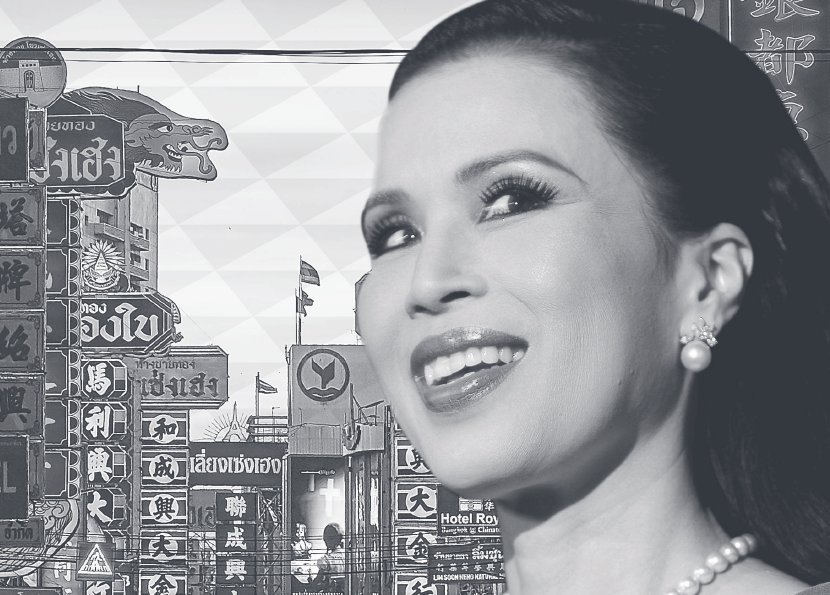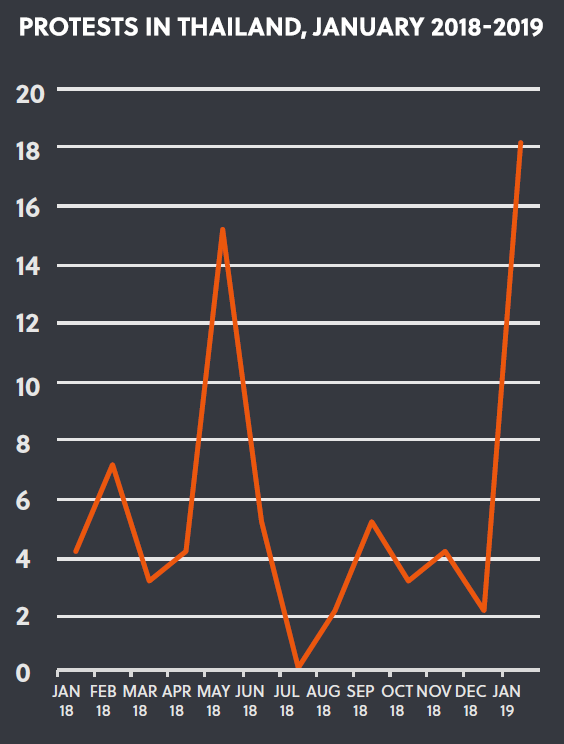The Princess' Gamble: Thai Politics Ahead of the March 2019 Election

Royals, Generals and Exiled Billionaires
In February 2019, in a move that surprised many, Princess Ubolratana, the eldest sister of Thailand’s king, Maha Vajiralongkorn, announced she would stand as the Thai Raksa Chart Party’s sole candidate for prime minister in the upcoming 24 March general election. Within hours, the king intervened, issuing a royal decree forbidding his sister’s candidacy. Thai royals are constitutionally forbidden to be directly involved in parliamentary matters and, while Ubolratana officially forfeited her royal status after marrying a US national in the 1970s and claimed to be running as a common citizen, the king deemed her political ambitions to be “improper.”
With the monarch’s stated opposition to Ubolratana’s candidacy, Thailand’s election commission quickly approached the constitutional court to dissolve Thai Raksa Chart. The party forms part of a coalition of parties affiliated with the exiled former Prime Minister and billionaire, Thaksin Shinawatra. Thaksin, despite being ousted in a military coup in September 2006 and fleeing the country, retains significant behind-the-scenes influence. The potential dissolution of the party has raised the prospect of heightened political volatility ahead of, and after, the election. For opposition parties, these developments seemingly validate concerns that the current political establishment is trying ensure that the military maintains de facto control of the country and its institutions.
For over a decade, Thai politics have been divided into the populist pro-Thaksin faction, collectively known as the “red-shirts” and the anti-Thaksin faction, the “yellow-shirts” who are comprised of royalists and ultranationalists. Violence between these factions prompted the military to stage a coup in March 2014, ousting Thaksin’s sister, Prime Minister Yingluck Shinawatra, who also fled into exile, and a military junta has ruled the country ever since.
Prayut Chan-o-cha, a former general and the current head of the military government, plans to stand in the upcoming election, thereby ensuring the military retains its pre-eminent position in Thai society. If successful, the alliance between Princess Ubolratana and Thaksin could seriously undermine Prayut’s ambitions. The military presents itself as safeguarding the interests of the monarchy against Thaksin’s populism, which aims to redress economic imbalances between urban areas, especially Bangkok, and rural areas in the country’s populous northern regions. Parties linked to Thaksin have won every election since 2001 due to the popularity of these policies among the rural majority. However, with a royal on board, the Thaksin camp found a means of bridging the divisions between red- and yellow-shirt factions, thereby undermining the military’s position. As prime minister, Princess Ubolratana could have been able to lobby the king to allow the exiled Shinawatras, Thaksin and Yingluck, to return.
This plan, however, unravelled due to the king’s intervention. The pro-Thaksin camp will struggle to find another candidate capable of bridging Thailand’s entrenched political divide. The military will likely continue to be influential, and tensions will remain elevated. Indicative of Thailand’s heightened political tensions, the Pheu Thai Party, another pro-Thaksin party, said it would slash military spending if elected. In response, the Commander in Chief of the Armed Forces, Apirat Kongsompong, made a veiled reference to the Nhak Paen Din (Scum of the Earth), a controversial nationalist song. Opposition figures interpreted this as a threat, as the song was used to whip up support for the military’s violent suppression of student activism in the 1970s, and many senior pro-Thaksin figures are former students who survived the crackdown.
Civil Unrest
After junta-imposed restrictions on public gatherings and free expression were lifted in December 2018 ahead of the 24 March election, the number of protests in Thailand increased. Recent protests primarily revolved around the decision to delay the election from February to March 2019 due to a scheduling conflict with King Vajiralongkorn’s coronation. It was the sixth time the military junta delayed the election since coming to power. Opposition activists said the delays were a response to corruption scandals implicating prominent figures in the military, which would have hurt the military’s chances of retaining political influence after a return to civilian government, with the public less likely to vote for pro-military parties. Widespread and violent civil unrest, including armed clashes between rival factions in Bangkok, characterised the lead-up to the past two coups, in 2006 and 2014. However, Thailand’s most recent protests have been largely peaceful and caused limited disruptions.

According to most polls and expert commentaries, the majority of Thai citizens are tired of the violent civil unrest and political volatility which have marred the country’s recent history, and favour a peaceful return to civilian rule. Protests stemming from the potential dissolution of Thai Raksa Chart and the military’s attempts to retain political influence will likely be peaceful in the short-to-medium term. Nevertheless, given Thailand’s entrenched and seemingly intractable political divisions, the seeds of future conflict between the military establishment and the pro-Thaksin movement remain in place, raising the prospect of renewed violent unrest in the future. Thailand’s politics have historically fluctuated between periods of reform under figures like Thaksin, followed by clampdowns and a reassertion of the status quo by the conservative military establishment. Given the military’s entrenched opposition to reform, and the continued calls for greater distributions of political and economic power from the pro-Thaksin camp, this pattern will likely continue.
Who's Who?
THE MONARCHY
KING VAJIRALONGKORN. The king succeeded his father, King Bhumibol, in October 2016. King Vajiralongkorn has reportedly played a more assertive role in Thai politics, for example, by taking a greater role in royal household appointments, creating a 1,600-strong royal police security force, requesting changes to the military-drafted constitution, and, intervening to prevent his sister from standing for prime minister.
PRINCESS UBOLRATANA. The princess is the eldest child of the late King Bhumibol. Despite renouncing her royal status after marrying a US national in the 1970s, she continues to engage in charitable activities in the name of the monarchy.
PRO-JUNTA
The pro-junta faction views itself as safeguarding the interests of the monarchy, and opposes wider political participation, especially among the rural majority which largely supports populist policies. It fiercely opposes Thaksin’s plans to return to Thailand. It is largely supported by the urban elite, especially in Bangkok. This faction includes:
PRAYUT CHAN-O-CHA. Prayuth, Thailand’s current Prime Minister, is the general who led the May 2014 coup which ousted Yingluck Shinawatra. He retired from the army after coming to power and will stand for prime minister in the 24 March general election.
PHALANG PRACHARAT PARTY (PPP). The PPP is a pro-military, conservative party led by retired generals, including Prayuth. If the PPP is elected, the military will continue to wield considerable influence.
NATIONAL COUNCIL FOR PEACE AND ORDER (NCPO). The NCPO is the military junta. While it will be dissolved following the 24 March election, it hopes to retain political influence through civilian proxies, such as the PPP.
PRO-THAKSIN
Pro-Thaksin groups comprise left-leaning pro-democracy activists. Its primary support base is Thailand’s rural majority. Rural voters reportedly like the faction’s populist policies aimed at reducing the economic disparity between the cities and rural areas. This faction includes:
THAKSIN SHINAWATRA. Thaksin is a billionaire and former prime minister who, despite being ousted in a coup in
September 2006, retains significant behind-the-scenes influence.
YINGLUCK SHINAWATRA. Yingluck is a former prime minister, who is also Thaksin’s sister. She was ousted in the most recent military coup in March 2014. Like Thaksin, she fled Thailand and remains in exile.
PHEU THAI PARTY. The party is the third incarnation of Thaksin’s original Thai Rak Thai Party, which was outlawed by successive military governments.
THAI RAKSA CHART. The party reportedly serves as a “backup” party for the Pheu Thai Party, thereby forming part of a broad, pro-Thaksin coalition.